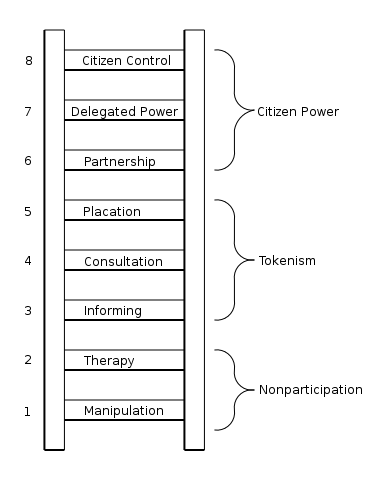Feministische Technikforschung
VU 3.0 ECTS, SoSem2023, TU Wien
jackie / Andrea Ida Malkah Klaura <andrea.klaura@tuwien.ac.at>
tiss: 034.016 Feministische Technikforschung
https://tantemalkah.at/2023/feministische-technikforschung
 Alle Inhalte, sofern nicht bei einzelnen Elementen anders vermerkt, wurden von Andrea Ida Malkah Klaura
unter einer Creative Commons Namensnennung - Weitergabe unter gleichen Bedingungen 4.0 International Lizenz erstellt.
Alle Inhalte, sofern nicht bei einzelnen Elementen anders vermerkt, wurden von Andrea Ida Malkah Klaura
unter einer Creative Commons Namensnennung - Weitergabe unter gleichen Bedingungen 4.0 International Lizenz erstellt.
Session 8: Outline
- Check-in
- Input-Sequenz:
Partizipation und Public Engagement with Science & Technology - Diskurs-Sequenz
- Checkout & Vorbereitung auf Session 8
Check-in
- Aktiver Teilnahmecheck : siehe TUWEL
Partizipation und Public Engagement with Science & Technology
Wer macht Wissenschaft?
- Akteur*innen in der technowissenschaftlichen Praxis
- Einbindung von Nicht-Wissenschafter*innen
- partizipative Forschungsmethoden
- public consultation auf Policy-Ebene
participatory turn
- Veränderung des Verhältnisses von Technowissenschaft und Öffentlichkeit(en)
- vor allem seit den 1980er/90ern
- laut Martin Lengwiler von Sheila Jasanoff geprägt, 2003
- Jasanoff:
- Professor of Science & Technology Studies @ Harvard
- Fokus: science policy making, science governance
- Concepts: technologies of humility, civic epistemologies
- "What is the 'participatory turn' in science & technology studies?"
"Traditionally, scientists and researchers have been seen as the sole authorities on scientific knowledge, with the public viewed as passive recipients of this knowledge. However, the participatory turn challenges this view by emphasizing the importance of including diverse perspectives and experiences in the research process. This approach acknowledges that scientific research can have significant impacts on society, and that those who will be affected by scientific developments should have a say in how research is conducted and how its results are used."
(ChatGPT Mar 23, asked 2023-05-30: What is the "participatory turn" in science & technology studies?)
"The participatory turn has led to the development of a range of participatory research methods, such as citizen science, participatory action research, and co-design. These methods involve collaborating with non-experts to identify research questions, design studies, collect data, and analyze results. This approach can lead to more socially relevant and responsible research, as well as greater public engagement with science and technology." (ChatGPT Mar 23, asked 2023-05-30: What is the "participatory turn" in science & technology studies?)
participatory return
- Brian Wynne, Prof. Emeritus of Science Studies @ Lancaster
- Public Understanding of Science (PUS) & Public Engagement with Science & Technology (PEST)
- Verhältnis von Expert*innen- und Lai*innen-Wissen zur technowissenschaftlichen Politikgestaltung
- East Asian Science, Technology and Society (1), 2007:
"It may be more appropriate to call this a ‘participatory return’, since a similar mushrooming of such initiatives took place in the 1970s in Western countries, albeit with some significant differences." (Wynne 2007, p. 100)
mushrooming of initiatives?
"One of the pervasive problems in the endlessly escalating and globalising arenas of public reactions to what is called ‘science’ (or often its de-facto synonym, ‘risk’), is the dearth of serious questioning of what is this object—‘science’? ‘risk’? ‘uncertainty’?—which has usually been just taken for granted as the origin of meaning for all the actors involved." (ibid)
Verhältnis von Öffentlichkeit zur Wissenschaft
- ist zu hinterfragen, weil
- es wird ein reaktives Verhältnis angenommen
- unklar was "science" in diesem Verhältnis überhaupt ist
"This also imposes a hugely problematic, unacknowledged normative commitment as to the subject-identities of those publics. The mushrooming academic field which claims to clarify these issues over ‘public engagement with science’ often appears uncritically to reproduce and reinforce those same actors’ categories." (ibid)
Kritik an herkömmlichem "public engagement"
- bloßes Anerkennen, dass öffentliche Befragungen, Beteiligungen, oder gar tatsächliche Partizipation im Forschungsprozess wichtig sind, reicht nicht
- Konnex zu feministischen Ansätzen: expliziter bzw. strukturell machtkritischer Anspruch
- wie wird "Beteiligung" geframed
- wer kann sie wie und wann initiieren?
- intersektionale Analyse von Stakeholder:innen
- nicht nur im Fall von "Risikotechnologien" notwendig
Sheila Jasanoff 2003:
Technologies of Humility: Citizen Participation in Governing Science.
- bezieht sich auf Charles Perrow: "Normal accidents : living with high-risk technologies" (1984)
- hohe Komplexität und engle Kopplung führen unweigerlich zu katastrophalen Fehlern
- 1984-86: Bhopal, Challenger, Tschernobyl
- zunehmendes öffentliches Bewusstsein für Technopolitiken
- Accountability: alle relevanten Stakeholder:innen miteinbeziehen
- Rolle von Expert:innen, Bürger:innen und Entscheidungsträger:innen überdenken
- Partizipation allein führt nicht zur Demokratisierung technischer Gesellschaften
- es braucht neue "institutionalized habits of thought" (Jasanoff 2003, p. 227)
- etablierte Technikfolgenabschätzung: predictive methods um Technologien kontrollierbar und verwaltbar zu machen
- drei zentrale Mängel:
- "peripheral blindness" gegenüber Unsicherheit und Ambiguität
- Vorwegnahme (preemption) einer politischen Diskussion
- Gefahren außerhalb der "framing assumptions" werden nicht gesehen
- technologies of hubris
technologies of humility
- Set an Techniken und instiutionalisierten Prozessen
- nicht für Vorhersage und Sicherheit
- ergänzend zu technologies of hubris
- um unvorhergesehen Konsequenzen zu behandeln
- "plural viewpoints" & "collective learning"
- "what is the purpose; who will be hurt; who benefits; and how can we know?" (p. 240)
- Anwendung beider "social technologies"
- bessere Analyse von Implikationen neuer Forschung/Technologie
- Bezug zu Mode-2 science (Nowotny et al.)
- 4 Fokuspunkte: "framing", "learning", "distribution" and "vulnerability"
Verschiebung im STS-Blickwinkel
- weg von einem "deficit model" des "public understanding of science"
- hin zu einer Perspektive des "public engagement with science & technology"
- starker Fokus auf Policy-Ebene
- wenig zu Partizipation in konkreten Forschungsmethoden
- Zur Formierung unterschiedlicher Öffentlichkeiten und Transdisziplinarität auch konkreter Methodenebene: Klaura 2016 & 2014
Sherry Arnstein: A Ladder of Citizen Participation
- 1969 im Journal of the American Planning Association
- 2004 von Duncan Lithgow online reproduziert

Diskurs-Sequenz
- Offene Frage- & Antwortrunde zum Input
- Diskussion unterschiedlicher Verhältnissen von Technowissenschaften und Öffentlichkeiten anhand Etherpad mit Beiträgen aus der Einstiegs-Sequenz
- Diskussion der ersten Moodle-Aufgabe
meetup teaser

Vorbereitung auf Session 9
- Fausto-Sterling, Anne. 2000. “The Five Sexes, Revisited.” The Sciences 40 (4): 18–23.
- Details im TUWEL-Kurs
Checkout
slido.com : #2062598